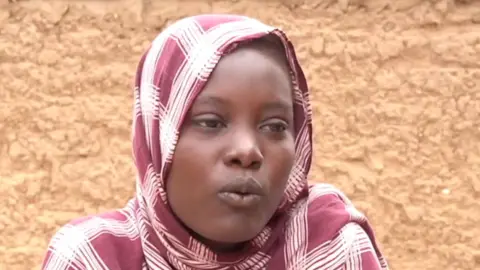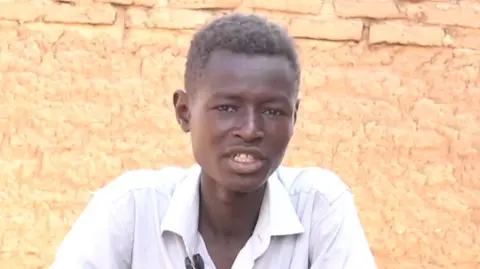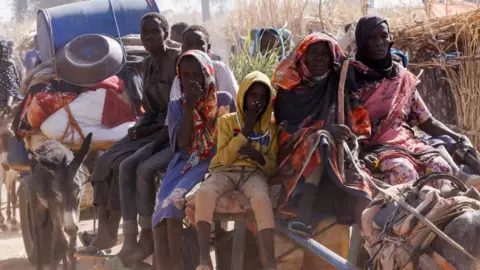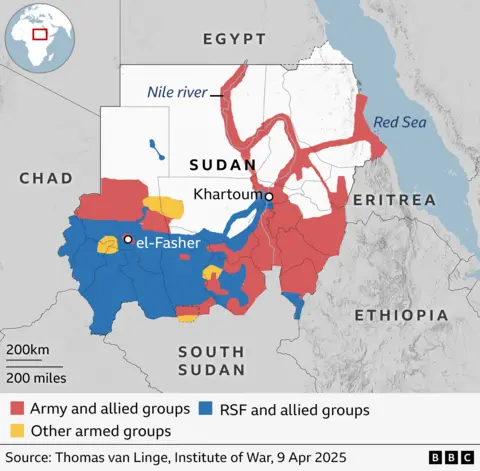Physical Address
304 North Cardinal St.
Dorchester Center, MA 02124
Physical Address
304 North Cardinal St.
Dorchester Center, MA 02124

ATTACHING EDITOR OF AFRICA
 BBC
BBCAt 19, Alawia Babiker Ahmed aborted when she fled at the foot of the devastating war that has devastated the western region of Sudan in Darfur.
“I was bleeding along the way,” he told the BBC, before hurrying to add that he saw people who were “worse” during his traumatic three-day walk of approximately 70 km (45 miles) from the besieged city of El-Fafasher to the small city of Tawila.
Dudding air attacks and militiamen after their spontaneous abortion, Alawia said that she and her family met a baby crying for her mother, who lay dead next to the road.
Alawia said he picked up the child and took him with her: “We covered the mother and move on.”
Sudan has been destroyed by a civil war since the struggle between the army and the rapid support forces (RSF) broke out in April 2023, causing one of the worst humanitarian crises of the world with more than 12 million people forced to flee their homes.
Darfur has been an important inflammation point, with the RSF controlling most of the region, except the city of El -fasher that has remained in the hands of the army and its allies.
The-Fafasher has been an intense bombing when the RSF tries to seize him. In April he announced plans to form a government to rival the one established by the Army, which increases the fear that it can lead to the Sudan partition.
Alawia said that when the bombing intensified last month, she and her family were forced to flee and walk Tawila, west of El-Fafasher.
His brother, Marwan Mohamed Adam, 21, told the BBC that he was attacked on the way by allied gangs, including being “beaten in my neck, arm and leg” and stolen from the few belongings he carried.
Marwan added that his life was saved just because he lied to the gangs about where he had come.
He said that the attackers took and “executed” young men who revealed that they were from El-Fafasher, so when he was questioned, he said it was from Shaqra, a stop on the way to Tawila.

“You feel fear, you feel that you are already dead,” the 21 -year -old told the BBC, adding that he saw three bodies along the way.
Another woman, Khadija Ismail Ali, told the BBC that “the bodies were scattered throughout the streets.”
She said that 11 family members were killed during El-Fasher’s bombing, and three children died during her four-day trip from the city to Tawila.
“The children died from thirst along the way,” Khadija said.
The village of his family, El-Tarkuniya, was attacked last September by RSF allied militias, who stole their harvest.
They fled to the Zamzam camp affected by hunger, and then to El-Fafasher and now to Tawila.
The medical beneficial organization Applies said that the gunmen took the land and farms of most families by attacking the villages.
Severe malnutrition, especially among children who arrive in Tawila, had reached an alarming level, he added.
Alawia said her sister dropped the small food they had while fleeing the air attacks and bombings they found after Shaqra passed.
“They were the well -left beans with a little salt that we had taken in our hands to feed the children,” he said.
 Reuters
ReutersWithout food or water, they walked and met a woman who told them that they could find water in a nearby town.
The family left after midnight for the town, but they knew that they were entering an area controlled by RSF fighters.
“We greet them, but they did not respond. They told us to sit on the ground and looked for our belongings,” Alawia recalled.
The fighters took the 20,000 Sudanese pounds ($ 33; £ 24) that still had the whole family, along with the clothes and shoes they carried.
“My shoes were not good, but they still took them,” Alawia said.
He added that the RSF gunmen refused to give them water, so they all continued until they reached the town of El-Koweim. There, they saw a good protected by the RSF fighters.
“We asked for water at least for the orphan girl, but they refused,” Alawia said, adding that he tried to break through the well, but the men attacked and beat her.
Thirst and exhausted, the family continued to walk until he reached Tawila, where Alawia said she collapsed and was urgently taken to the hospital.
It was discharged after being treated. Marwan was also treated for the wounds he had suffered during the beating.
Alawia said they later looked for relatives of the baby they had rescued, and after finding some of them, they delivered the child.
Alawia and her family now live in Tawila, where a family has received them at home.
“Life is fine, thank God, but we care about the future,” Alawia told the BBC.
Marwan said he wanted to go abroad to continue his education and start a new life.
This is something that millions of Sudanese have made, since their lives have been destroyed by a war that does not show signs of completion.

 Getty Images/BBC
Getty Images/BBC